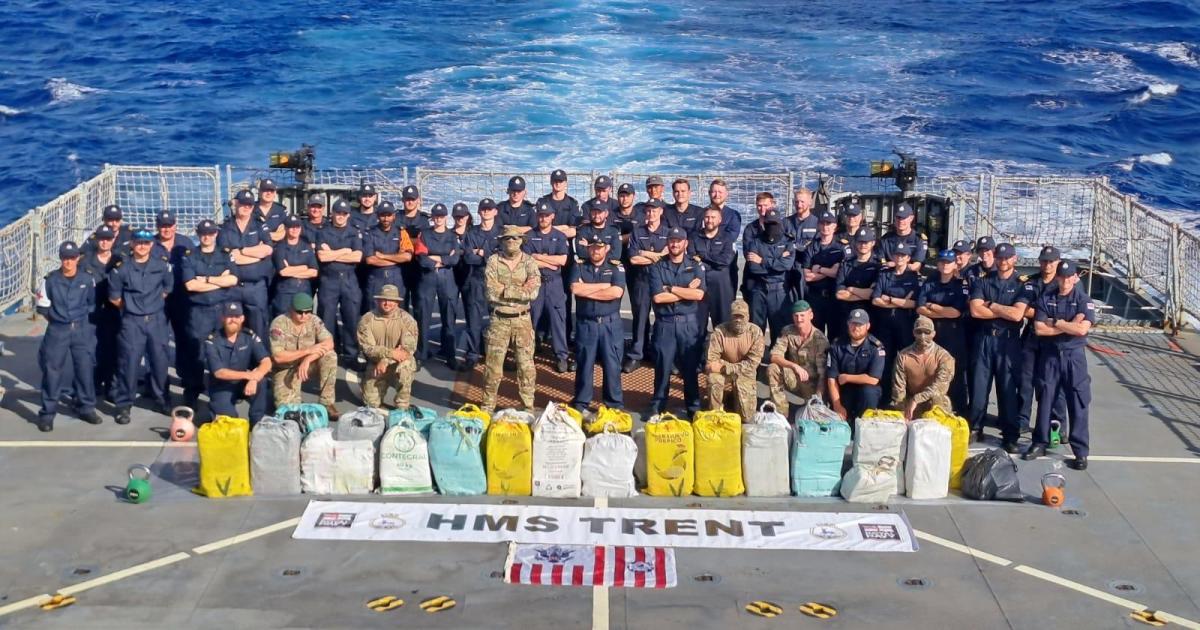In a scene that could have been lifted from a Hollywood screenplay, a British warship and an American patrol aircraft chased down a speedboat as its crew tried to flee and dump its cargo of drugs into the water near the U.S. Virgin Islands, officials announced Monday.
British sailors on HMS Trent and a U.S. Coast Guard team eventually intercepted the alleged drug-smuggling boat and recovered about 6,000 pounds of cocaine and other drugs, the U.K.’s Ministry of Defence said in a news release. The drugs had an estimated street value of $280 million.
“During a high-speed chase, the smugglers tried to offload their illegal cargo, but Royal Marines coxswains and the USCG boarding team closed in, took control of the vessel, and detained four crew members,” the ministry said.
After the boat was intercepted, the HMS Trent crew scoured 24 square miles of the Caribbean Sea south of the U.S. Virgin Islands for 10 hours, eventually retrieving almost 2,000 pounds of cocaine, officials said. The bust came just three weeks after HMS Trent seized $90 million of cocaine in a separate operation in January.
A Royal Marine who took part in the most recent seizure said the operation forced the crew to push their boats to the limit.
Last month, the Colombian navy seized over 1.3 million tons of cocaine from boats during three separate operations in the Caribbean Sea. Officials said the crew members of one of the suspicious vessels abandoned ship when they saw authorities closing in.
In addition to speedboats, semi-submersibles — also called “narco subs” — are popular among drug traffickers in the Caribbean as they can potentially elude detection by authorities. The vessels never go fully underwater, and they are sometimes intercepted while heading to the United States, Central America and Europe.
“Despite their best efforts to evade us, they finally gave up the chase and we were able to get alongside and enable members of the U.S. Coast Guard to seize the vessel,” said the Marine who could not be named for operational reasons.
In a statement, Commanding Officer Tim Langford praised the British crew and U.S. Coast Guard team for the successful bust.
“The achievements of this ship and her crew in the last nine months have been spectacular, and it is brilliant to see the hard work and dedication of this amazing team paying off,” said Langford. “The team is rightly proud of their efforts, and those of our USCG colleagues.”
Officials did not disclose exactly when the seizure was made or where the alleged drugs were coming from but many of the narcotics trafficked in the Caribbean Sea originate in South America — especially Colombia, which produces about 60% of the cocaine found in the world.
Last month, the Colombian navy seized over 1.3 million tons of cocaine from boats during three separate operations in the Caribbean Sea. Officials said the crew members of one of the suspicious vessels abandoned ship when they saw authorities closing in.
In addition to speedboats, semi-submersibles — also called “narco subs” — are popular among drug traffickers in the Caribbean as they can potentially elude detection by authorities. The vessels never go fully underwater, and they are sometimes intercepted while heading to the United States, Central America and Europe.
